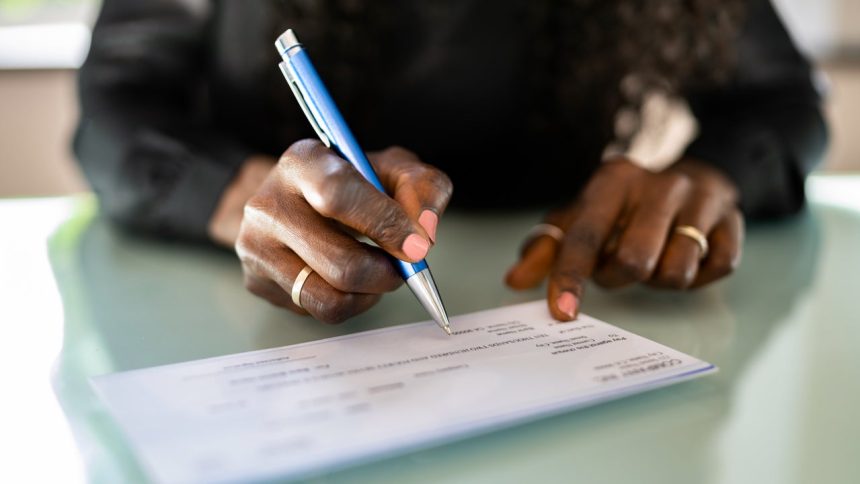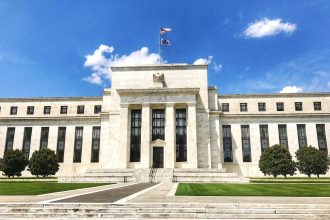Key takeaways
- If you don’t have a bank account and need to cash a check, you’ll likely wind up paying some hefty fees for the service.
- Cashing a check without a bank account carries some bigger risks – namely walking around with a wad of cash that can be lost or stolen.
- Some banks offer second-chance checking accounts, which can be a helpful way to lay the foundation for financial success if you have struggled with a bank account in the past.
Received a check but don’t have a checking account? You’re not alone. Data from the Federal Reserve shows that six percent of households are unbanked, meaning they don’t have any bank account to help manage their money.
There are ways to cash a check without a bank account, although none of them are nearly as easy – or as affordable – as having a checking account. Read on to learn what to do with that check so you can access the funds.
1. Cash your check at the issuing bank
First, look at the check to figure out where the person or business who made it out to you does their banking. If that bank has branches in your area, call to find out if they cash checks for non-customers. Many banks will cash a check that is written by a checking account holder at that bank, even if it is payable to a noncustomer. There must be enough money in the payer’s account to cover the check. The payee (the person the check is issued to) will be asked to show a government-issued photo ID, such as a driver’s license, before the bank will cash the check.
How much does it cost? It varies by bank, but don’t expect to get it for free. For example, Bank of America charges $8 for any check over $50. If you have to cash one check every month this year, that adds up to $96. You’re better off comparing the best free checking accounts to see if you’re eligible to open one.
2. Cash your check at a retailer
If the issuing bank isn’t an option, your next best bet is a major retailer such as Walmart or Kroger – both of which offer financial services including cashing checks. There are some limitations, though. For example, Walmart primarily only cashes the following types of checks: payroll, government-issued, tax refund, cashiers’, insurance settlement and 401(k).
How much does it cost? Walmart charges $4 to cash checks up to $1,000 and a maximum fee of $8 for checks greater than $1,000. In some cases, Walmart cashes two-party personal checks, but these are limited to a maximum amount of $200 and come with a $6 fee. Kroger has a fairly similar pricing structure, but if you have a Kroger Shopper’s Card, you will get slightly reduced pricing – 50 cents less – for the service.
3. Load funds onto a prepaid debit card
Consumers who don’t have bank accounts sometimes use prepaid cards to deposit checks and access their cash. Prepaid cards are similar to checking account debit cards. Your spending is limited by how much money you have loaded onto the card. Additionally, if you register your prepaid card account, you may be able to qualify for some additional protections with the money such as insurance from the Federal Deposit Insurance Corp., or FDIC.
Prepaid cards have different options for check cashing. Some prepaid cards let you set up direct deposit so that checks are automatically loaded onto the card. Other cards come with an app that lets you snap a picture of your check to load it onto your card. Or, you might be able to deposit your check at an ATM to load the money onto the card.
How much does it cost? While depositing your check may not come with a specific fee, make no mistake: Prepaid cards can be quite costly. There are monthly fees, ATM withdrawal fees, reload fees, inactivity fees and a range of other costs associated with them. For example, GreenDot charges a $7.95 fee each month that you don’t add at least $1,000 to the c ard via direct deposit. And if you don’t have direct deposit available, you’ll pay up to $5.95 every time you add cash at a retailer.
4. Sign your check over to someone you trust
Another way to cash a check without a bank account is to sign the check over to a trusted friend or relative who has a bank account and have them cash the check at their bank.
Make sure the person you are signing over your check to is willing to cash the check and that their bank will cash it. You should accompany your trusted friend to the bank in case the teller requires your ID or has questions about the check. Your friend will also need to have proper identification.
How much does it cost? Well, as long as your friend is a good friend, it should be free. However, keep in mind that you’re going to be carrying around a bunch of cash – which means that if you lose it, you’re out of luck.
5. Cash your check at a check-cashing outlet
A check-cashing store might seem like the most obvious place to cash a check, but there’s a reason that they’re last on this list: Some of them are absurdly expensive. Some require customers to become “members” or to buy check-cashing ID cards before cashing checks. In addition to a membership fee, they might charge a first-time use fee.
How much does it cost? There’s no simple answer for this, as maximum check-cashing fees can vary from state to state. Additionally, the pricing menu at check-cashing stores can feel quite confusing. There are different rates for government checks vs. tax refund checks vs. personal checks vs. payroll checks. For an idea of how much you can wind up paying, consider the pricing structure at Amscot: Personal checks have a 9.9 percent fee. So, if you wanted to cash a $500 check, you would wind up handing $49.50 over the store and walk out with $451.50 – not exactly a good deal.
Bottom line
All of these check-cashing alternatives carry more risks and more costs than cashing or depositing your check at your own bank. They’re also pretty inconvenient, especially compared to direct deposit.
If you haven’t been able to qualify for a standard checking account, some banks offer second-chance checking accounts. These accounts give customers the opportunity to prove they can responsibly manage a checking account so that eventually they can qualify for and enjoy the benefits of standard bank accounts. Having a checking account at a bank or credit union is still the safest, most convenient and least expensive way to cash checks.
— Former contributing writer Libby Wells contributed to a previous version of this story, and former Bankrate writer René Bennett contributed to a previous update of this story.
Read the full article here
















